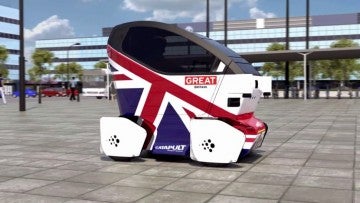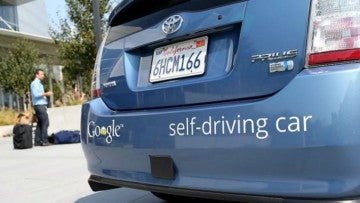The days of the traffic warden could soon be numbered. Cities are looking to dispense with the uniformed enforcers who pound the streets looking for illegally parked cars, doling out tickets and imposing fines.
But careless parkers should not rejoice too soon as there’ll be no parking free for all. Like so many professions, the civic enforcement officers are likely to fall victim to digitisation. Cities are looking at embedding digital sensors into parking spaces that read vehicle number plates and can tell how long an automobile is parked. The data will be collected centrally and parking charges made directly to the driver’s bank account, as will any fines.
Parking is just one of many areas set to be transformed by the smart city revolution. City leaders are looking to use the latest technology to save cash and help turn their urban jungles into digital Gardens of Eden. From smart parking and intelligent rubbish bins, which alert collection vans when they are full, to street lights that only shine when people walk beneath them, cities are going high tech.
Changing how cities are run
“There are a few technologies around now that are radically going to change the way we operate in cities,” says Peter Reynolds, chief technology and innovation officer for the Future Cities Catapult, a body that promotes smart cities in the UK.
Bristol, Glasgow, London, Manchester and Milton Keynes are all experimenting with new ways of running services with the latest technologies
Mr Reynolds warns that spiraling social care costs from a growing population of older people and children, alongside deep cuts in funding, mean local authority budgets are coming under increasing pressure.
Local authorities are seeing their budgets slashed as part of central government’s austerity drive, in some cases by up to 40 per cent over the next five years. At the same time, urban populations are exploding; London will have more than a million extra inhabitants in the next 15 years.
“What this says to me is that as a society we have to get much better at how we design and provide our services, and technology is going to have to play a key role in doing that,” says Mr Reynolds.
As with so many developments in the modern economy, data will be the fuel of the smart city engine. A handful of UK cities are grasping the nettle and looking to transform their services.
Bristol, Glasgow, London, Manchester and Milton Keynes are all experimenting with new ways of running services with the latest technologies. They are using the internet of things, installing sensors across infrastructure to gather information on usage and to help direct operations centrally.
A number of cities are experimenting with driverless cars, the ultimate in smart city technology. City authorities are also collecting data from everything from pedestrian flows, population estimates and energy use, and looking for ways to use the information to improve services.
Open data is key
Key to smart-city thinking is allowing developers to access the centrally collected data about urban activities so they can then turn this into useful applications, whether in transport, healthcare, improved air quality or energy use. Open data will be key for smart cities to thrive.
Citizens need to be aware of how personal data is collected and encouraged to become informed about the move to smart cities – to keep a watchful eye
For instance, London Datastore, created by the Greater London Authority, offers 600 datasets on its website and receives some 45,000 unique users a month. It features data on public transport journeys, supplied by Transport for London. This data has helped create the Citymapper smartphone app for London, which offers easy-to-use transport information all in one place, from bus timetables to cycling and walking times.
Meanwhile, Bristol is looking to become a test-bed for smart initiatives and has a high-speed fibre network – a leftover from cabling infrastructure – to power the project. The city wants to link up Bristol University’s supercomputer with partners, such as technology firm NEC, to install sensors and connectivity across the urban infrastructure. The Bristol is Open project will turn the city into a petri dish for innovation, providing the infrastructure to allow development to flourish.
“An open, programmable city”
“Rather than someone sitting in the middle of the city pulling levers, it is an open, programmable city,” says Max Wide, strategic director of business change at Bristol City Council. “It is akin to the Apple App Store – we create the infrastructure and create the rules and see what developers can do with it.”
An area where Mr Wide says centralising data has brought transformative results is in the city’s scheme to help troubled families. “We bring together in one place data sets from our partners, from the council, education and health. By bringing the information together we can work with families on the edge of getting into difficulties, where the tell-tale signs exist in different agencies. Only when you correlate them does that allow us to work with these families before they get into difficulties,” he says.
A challenge for many UK cities is how to graft or retrofit smart technology on to existing Victorian urban infrastructure
Mr Wide acknowledges that such approaches are not infallible and says there can be “false positives”. Data gives only general results and may indicate problems where they don’t exist. But the system can indicate those who are potentially facing difficulties. In addition, there are plans to develop telecare, where sensors are installed in the homes of elderly and vulnerable people to alert carers to problems.
But placing sensors across city infrastructure and collecting increasing amounts of data about civic activities could create a prying, Orwellian state. Citizens need to be aware of how personal data is collected and encouraged to become informed about the move to smart cities – to keep a watchful eye.
Smart infrastructure
New cities across the globe are being built with smart infrastructures, such as the Songdo International Business District in South Korea, constructed on reclaimed land near the capital Seoul. Another is Masdar City in Abu-Dhabi, which is being built as a clean tech hub.
A challenge for many UK cities is how to graft or retrofit smart technology on to existing Victorian urban infrastructure. In 2013, Glasgow beat a number of other cities to win £24 million worth of funding from the Technology Strategy Board, now known as Innovate UK, to experiment with smart city initiatives. For instance, it has created the Glasgow Operations Centre, which brings together city-wide CCTV, traffic management and police intelligence so the authorities can respond to a range of incidents across the city.
The UK is also building developments from scratch with plans for three new garden cities. The Ebbsfleet Garden City in Kent, with capacity for 15,000 new homes, recently appointed developer Aecom and promises to have smart-city thinking at its heart.
As Louise Wyman, Ebbsfleet Development Corporation’s director of strategy, says: “In future in Ebbsfleet, we’ll see a green corridor, a linear park with people cycling and kids walking, maybe outdoor gym equipment. Under the grass and trees there would be high-capacity cables to get data into homes, so they have real-time bus information, so they can see when the next train to Paris leaves and when the bus will be outside the door to take them to that train.
“There will be a new sewage system and water supply, and we can have smart meters in people’s homes to see how much water they are using, how to use greywater to flush loos.”
Aecom’s director of design, planning and economics Tom Venables believes the key issue for smart cities is integration, bringing together different utilities and organisations, involved with running the infrastructure, to share their data. “The most important thing is that it’s all facilitated by one body, with lots of people doing their own thing, but it is important to bring them all together,” says Mr Venables.
He adds: “At the moment, people around the world are struggling to define smart cities. But I think as time goes on, in the next five to ten years, it will just be the norm. Tech is evolving so rapidly, it will be expected that it is in place where you live. At Ebbsfleet this will be there from the start. In five to ten years, it will be the new normal everywhere.”
CASE STUDY: MILTON KEYNES
Milton Keynes is attempting to become a model smart city. It is trialing numerous futuristic initiatives, such as putting sensors in bins to tell waste collection trucks when they are full, testing out driverless cars and automating its parking services.
The city is expecting to grow fast, with 28,000 new homes and 1.5 extra jobs per home forecast over the next 15 years. This will mean a growth in mobility of 60 per cent, while the city estimates that it can only cope with a 25 per cent increase unless it takes some radical steps.

The two-seater driverless pods are expected to hit the streets of Milton Keynes in 2017
The transport strategy commits to creating 10,000 new parking spaces over 25 years, but according to Sarah Gonsalves, head of policy and performance at Milton Keynes Council, this can be reduced by a third through automation of parking.
Sensors in parking spaces will enable utilisation to rise from the current rate of 82 per cent to more than 95 per cent by directing drivers to vacant spaces. There are plans for parking smartphone apps that direct drivers to available spaces and car manufacturers may embed this service in GPS systems.
“Right now we have traffic wardens – we won’t need them because people will be using the smart payment to pay, they’ll pay by the amount of time they are on the space, and we’ll know whether they are there or not because of the sensors and can charge automatically,” says Ms Gonsalves.
Meanwhile, the population boom will hike water usage by 20 per cent in an area that receives less rainfall than Sicily and is one of the driest regions in the country.
“We are going to try and maintain the current usage by better demand management, so with the data we get about household water use, we’ll let people know what they are using, what other people are using, and let them know what the weather patterns are like and give them data from soil moisture sensors. We will be using behavioural insight measures to encourage people to use less water,” she says.
The city is installing a huge number of sensors to deliver data on everything from parking and water moisture to air quality. These are low cost, but require a network to carry the data. Milton Keynes is piloting a city-wide, low-bandwidth network that uses TV white space, enabling the use of sensor data cheaply and effectively.
Changing how cities are run

